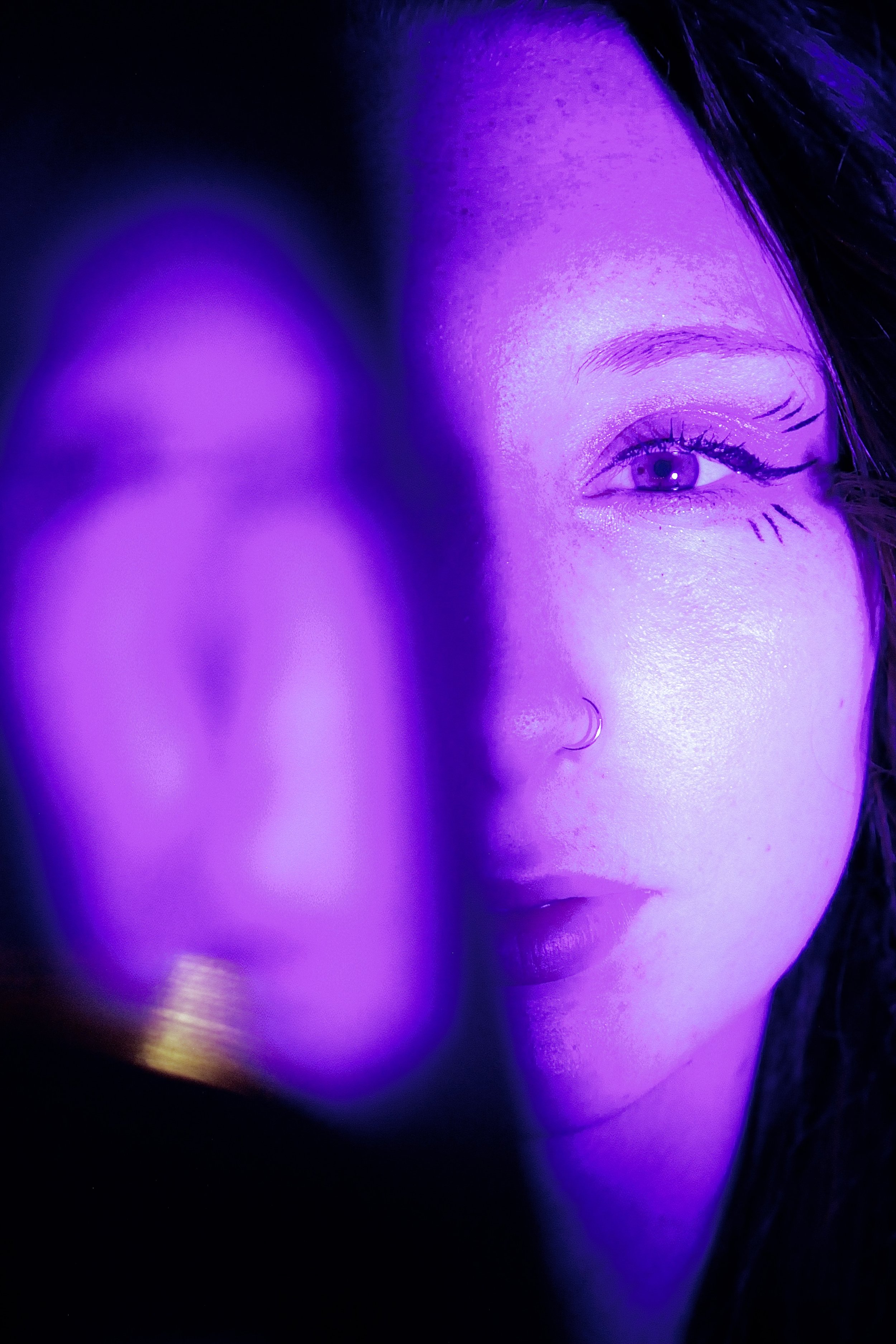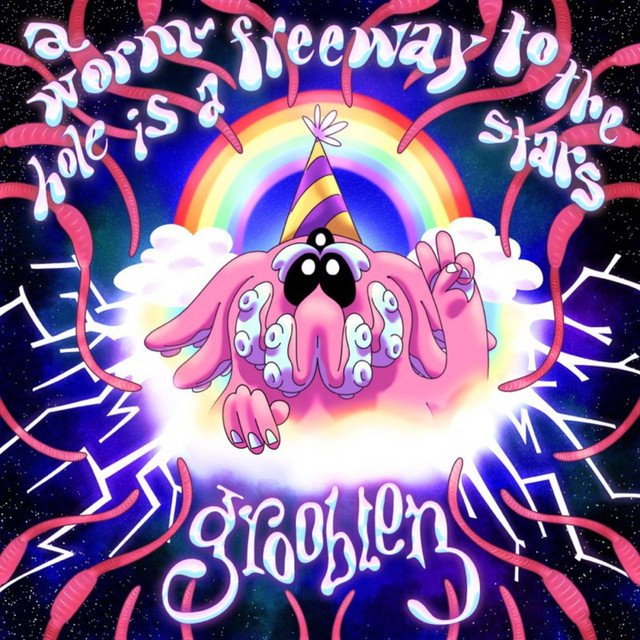PREMIERE: Grooblen’s Psychedelic Ode to Kindness, Coming to a Galaxy Near You
“PSYCHEDELIC CABARET DREAMPUNK” IS NOT THE FIRST THING — you hear when you ask a band what kind of music they play, but it’s certainly not a surprise in San Francisco. One of the city’s creative bravados, Ellie Stokes, takes on a new fusion of avant pop music in her project Grooblen. With new album A Wormhole is a Freeway to the Stars coming this summer, Grooblen, composed of Stokes, Alejandro Lara-Agraz, and Sean Aaron, has released “It Costs $0 To Be Kind,” a reflection on trauma and kindness.
“This is very much a ‘pick yourself back up again’ kind of song after something bad happens to you,” Stokes says about the single. “The song encourages folks to use their powerful humankindness to help each other despite feeling like everything is falling apart.”
Each single off the upcoming album has been a surprise — preceding release “Twiggy Molts” is a theatrical, piano-driven existentialist profession; “Gastropod” is a high-powered math rock snail metaphor. “It Costs $0 To Be Kind” is a tender indie-rock track with a ballad twist.
Inspired by King Crimson, St. Vincent, and Frank Zappa, Grooblen is a thread in the tightly woven San Francisco’s indie-rock roster. Last year, the band played Psyched Fest 2022, a music festival hosted by independent radio station Psyched! Radio SF, where they performed for Stokes’ associated project Big Leap Collective. Now, they continue to express themselves in unconventional ways.
Continue reading below to get to know Stokes, Grooblen, and her new album.
LUNA: First of all, super nice to meet you! Tell me about your artist journey from the start. How did you get into music, how did Grooblen begin, and what artists, people, and things inspire you and your sound?
STOKES: Hiii, Luna Collective folks! So nice to meet you too. I got into music from a very young age, with a background mostly in musical theater and training in classical piano. Grooblen was a project I started initially alone in my bedroom and jammed on for a few years by myself while I played in a couple of other bands in the Bay Area music scene. It wasn’t until my friend Jozie (Dogs that Bite) invited one of the other bands I was playing in to open for her band’s social distance album release show during COVID times and [my bandmates] weren’t available that I stepped up and said, “Hey, I could do my own thing!” She was down for it, so I got my brother to play drums at the time and our friend Jack to play bass. We became a very stripped-down trio and started gigging Grooblen tunes around the Bay Area as clubs started opening back up again.
LUNA: How did you come up with the name Grooblen?
STOKES: When I was a baby, I would make these singing/cooing sounds that my dad said sounded a lot like “groobs” and “groobles,” so Grooblen became a family nickname for me. It just sounds so perfectly silly and sing-songy and captures this sense of whimsy I try to capture in my music.
LUNA: How did you meet your bandmates? Is Grooblen more collaborative with them, or do you see it more as your own individual project?
STOKES: I met my current bandmates during a very strange time smack-dab in the middle of the post-COVID music scene in the Bay. Sean (drums) and I were both DJs at a community radio station and became friends through working on the film crew when we worked on virtual benefit shows for the station. Alé (bass) and I met through a band I sang backup vocals in and he played bass in called Rose Haze.
I come up with a lot of the general ideas for songs on my own with guitar/keys, melodies, and lyrics, but when we rehearse them we often collaborate on how the pieces mesh as an ensemble. However, there are a few tunes on this particular album that I wrote and put together by myself, which are most of the piano-based tracks! All the full-band stuff we each came up with our own parts for and workshopped over the past year or so through playing live in the Bay and touring.
LUNA: You describe your music as “psychedelic cabaret dreampunk.” Where did you come up with this definition?
STOKES: Ha! A friend of mine actually came up with it — they were describing the theatricality found in a lot of Grooblen songs, and this was coined at a time where we had incorporated some funny antics and weird storylines into our shows (ex. Our ridiculous Jazz Crab Pageant of 2022). I think it really rings true to the eclecticism of the genres we cover in our music while holding onto some of that classic San Francisco nostalgia for psychedelic music!
LUNA: You’re currently based in San Francisco — what is it like being a musician and artist/creative in this city?
STOKES: Wow, I’m so lucky. San Francisco is such a truly magical place and I’m so grateful to have mostly been raised here and to continue to live here while creating music and art! It’s pretty hard to keep up with everything going on, but watching people pursue their creativity amidst essentially staying afloat here is wildly inspiring.
LUNA: You say that your work “is a tangled testament to overcoming the ripples of traumatic experiences — sounds that soften and reset our rigid self-restriction as a trauma response to harmful experiences.” For you, does the healing come before or after the music? How does your view on and feelings about such experiences change after the music, either when you finish a recording or when you release it?
STOKES: Healing for me is definitely not a linear process, nor do I think it is for anyone. For me, music helps me process particular feelings caused by certain events, and for some reason playing these songs live doesn’t necessarily provide a great sense of catharsis. I think actually recording the song and realizing it’s going to basically stamp an imprint of remembrance of what I’ve experienced that’s out there in the world for anyone to listen to makes me super nervous, but [it] definitely helps me put these past experiences to rest and helps me connect with other people who might have a similar takeaway from listening to my music.
LUNA: Tell me more about the making of “It Costs $0 To Be Kind.” All of your singles so far have been really sonically diverse. What inspired the themes, concepts, and composition?
STOKES: This song means so much to me! It’s not only the last single release, but also the last tune on the album and I really want listeners to soak up the message and apply it to their own lives. The meaning of this song at its core is exactly what the title states, “It Costs $0 To Be Kind.” It doesn’t take much time or energy to express empathy. A simple “How are you?” or “I hope you’re doing well today!” can make a huge difference to someone and really only takes five seconds to do. The song ponders on this idea that putting just a little bit of care forward to those you’re surrounding yourself with can make a world of difference.
LUNA: This is your last single before your album, A Wormhole is a Freeway to the Stars, which comes out in June. Can you share anything more about the album as a whole?
STOKES: I can’t believe the album is out so soon! You mentioned earlier that the singles Grooblen has been putting out are very sonically diverse, and that is totally on purpose! I pieced this album together to give the listener an experience that’s a lot like listening to a playlist. Sometimes it’s a heavy rock tune, sometimes it’s a sweet folk ditty or a pop song… When I listen through it, I like to imagine I’m on a mystical spaceship ride and I’m looking out the window at all these different planets, asteroids, and stars. I really hope you like it!
A Wormhole is a Freeway to the Stars is out June 23 via Lavasocks.






